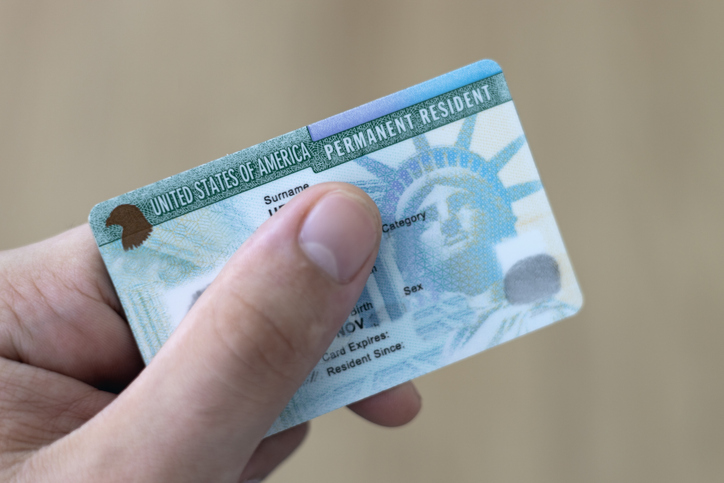Acquiring permanent residency in the United States means being able to live and work legally in the country indefinitely. Individuals granted permanent residency receive a permanent resident card, also known as a green card.
Depending on an individual’s circumstances, green cards can be family-based, employment-based, or granted through asylum. No matter the circumstances, obtaining permanent residency is a complex process that requires knowledge of immigration law, careful documentation, strict deadlines, and patience. Our experienced immigration lawyers for permanent residency can assist you through this complicated process.
Benefits of Lawful Permanent Residency
There are many benefits to lawful permanent residency in the United States, including:
- The right to indefinitely live and work in the United States
- A stronger path to citizenship
- Ability to access certain benefits like Social Security and Medicaid
- More legal protections
- Increased travel flexibility
- Higher potential for sponsoring family members
These benefits and others make lawful permanent residency an appealing status. Obtaining a green card is for those who desire long-term stability and the chance to harness the opportunities the United States provides.
How to Get a Green Card
Lawful permanent residence status requires meeting specific qualifications that depend on the type of green card you are seeking.
Family-Based Green Card
If you have a family member who is a US citizen or a lawful permanent resident, you may qualify for a family-based green card. The family-based green card process is a common pathway to lawful permanent residence.

Family-Based Green Card Eligibility
Immediate relatives have the highest priority for a family-based green card. You may qualify if you are:
- An unmarried child (under age 21 ) of a U.S. citizen
- A parent of a U.S. citizen who is age 21+
- The spouse of a U.S. citizen
For other family members, limited visas are available for relatives of U.S. citizens. You may qualify if you are:
- An unmarried child (age 21+) of a U.S. citizen
- A married son or daughter of a U.S. citizen
- A brother or sister of a U.S. citizen who is age 21+
For other family members, limited visas are available for relatives of lawful permanent residents (LPRs). You may qualify if you are:
- The spouse of an LPR
- An unmarried child (under age 21) of an LPR
- An unmarried child of an LPR age 21+
In addition, there are family-based green cards available for:
- Fiancé(e) of a U.S. citizen (spouse-fiance visa representation) and the fiancé(e’s) children
- Widow or widower of a U.S. citizen
- Violence Against Women Act (VAWA) self-petitioner
Family-Based Green Card Application Process
After determining with a family immigration lawyer if you qualify for a green card, the next step is the petitioning process. Most applicants must initially file two forms with U.S. Citizenship and Immigration Services (USCIS):
- Form I-130, Petition for an Alien Relative (to establish the family relationship)
- Form I-485, Application to Register Permanent Residence or Adjust Status
The petitioner must submit several supporting documents, such as:
- Proof of the family relationship (e.g., birth certificate, marriage certificate, adoption records)
- Evidence of U.S. citizenship or LPR status
- Form I-864, Affidavit of Support, to demonstrate the petitioner can financially support the family member
- Other supporting documents, such as police clearances and medical exams
The applicant must also attend a biometrics appointment to provide fingerprints, photographs, and a signature. Sometimes, an interview may also be required.
The length of the process depends on wait times and green card availability. A family immigration lawyer can make the process smoother by ensuring forms are filled out correctly and filed promptly, assisting with interview preparation, and offering peace of mind.
Employment-Based Green Card
Another common path to a permanent resident card is an employment-based green card. This usually requires an employer’s sponsorship and is divided into different preference categories based on the kind of work and the applicant’s qualifications.

Employment-Based Green Card Eligibility
The employment-based green card you may be eligible for depends on your professional background and work experience. There are five categories:
- First Preference (EB-1), Priority Workers are for persons of extraordinary ability in the sciences, arts, education, business, or athletics; outstanding professors or researchers; some executives or managers.
- Second Preference (EB-2), Professionals with Advanced Degrees or Exceptional Ability are for professionals holding advanced degrees (beyond a baccalaureate degree) and persons of exceptional ability in the sciences, arts, or business.
- Third Preference (EB-3), Skilled Workers, Professionals, and Other Workers are for skilled workers capable of stepping into a job requiring at least two years of former training, professionals holding baccalaureate degrees, and those with at least two years of unskilled labor experience.
- Fourth Preference (EB-4), Special Immigrants are for religious workers, certain broadcasters, employees or former employees of the U.S. government abroad, former employees of the Panama Canal Company or Canal Zone government.
- Fifth Preference (EB-5), Immigrant Investors are for employment creation investors who invest at least $1,500,000, or at least $800,000, if the investment is in a targeted employee area (TEA), a rural area, or an area with low employment.
Employment-Based Green Card Application Process
While specific steps to obtain lawful permanent residence through employment vary according to your preference category, there are some common steps to follow.
For some categories, the employer must first finish the PERM Labor Certification process to prove that no U.S. workers can fill the position. After that, the employer files Form I-140, Immigrant Petition for Alien Workers. Next, the applicant files Form I-485, Application to Register Permanent Residence or Adjust Status. Then, the applicant can either adjust their status if they are already in the U.S. or apply for an immigrant visa at a U.S. consulate abroad.
Your green card will be issued after approval. If you are not approved, an experienced immigration lawyer can help you appeal.
The employment-based green card system is designed to attract highly skilled individuals working in various industries to the U.S. Although the application process can be lengthy and complex, it provides a pathway to permanent residency for qualified individuals.
Green Card Through Asylum
An asylum green card means lawful permanent resident status in the U.S. for those fleeing persecution in their home country. Asylum is protection for those experiencing persecution due to one or more of the following:
- Race
- Religion
- Nationality
- Membership in a particular social group
- Political opinion

Asylum Green Card Eligibility
An individual granted asylum can apply for a green card after living in the United States for at least one year. Additionally, you must have been granted asylum by USCIS or an immigration judge and demonstrate that you risk persecution upon return to your home country.
To apply for asylum, you must first file Form I-589, Application for Asylum and for Withholding of Removal, with USCIS. You will also be fingerprinted, interviewed, and undergo a background check.
Asylum Green Card Application Process
To be granted permanent residence status through asylum, the first step is to file Form I-485, Application to Register Permanent Residence or Adjust Status. You must also submit the following:
- Proof of your grant of asylum
- Evidence you’ve been in the U.S. for at least one year
- Two passport-style photos
- Copy of your government-issued identification
- Copy of your birth certificate, if available
- Copy of your passport, if available
- Form I-163, Report of Immigration Medical Examination and Vaccination Record
- Certified police and court records of criminal charges, if applicable
- Form I-602, Application by Refugee for Waiver of Inadmissibility Grounds, if applicable
If you are denied asylum, our lawyers will help you appeal by demonstrating a credible fear of persecution in your home country if you return.
Green Card Lawyers Near You
Obtaining U.S. permanent residency is a significant milestone. Our immigration lawyers for permanent residency can assist with various green card categories, including family-based immigration representation, employment-based, and asylum legal representation, guiding you through each step of the process. Understanding and navigating the green card eligibility process is complex, requiring careful attention to requirements, documentation, and timelines.
Hiring one of our green card lawyers can ensure you navigate the legal requirements effectively, increasing your chances of success. Partnering with an experienced green card lawyer will provide peace of mind and expertise in achieving permanent residency status.

